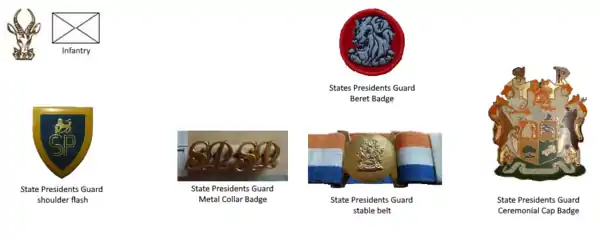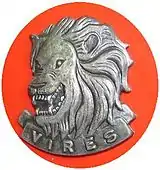State Presidents Guard
The State President's Guard [1] was a home guard for the South African State President and also acted as a guard of honour at ceremonial occasions.
| State President‘s Guard Staats President's Wag | |
|---|---|
 State's Presidents Guard Guardsman in full dress | |
| Active | 1967-1990 |
| Country | |
| Allegiance | President of South Africa |
| Branch | |
| Type | Honour Guards |
| Role | Ceremonial Duties |
| Garrison/HQ | Pretoria |
| Motto(s) | Vires |

History
Up to, and including State President Charles Robberts Swart's term of office, no permanent Guard existed. On his retirement from office on 31 May 1967, plans were made for the Guard to appear in public for the first time.
The Unit was established officially on 1 May 1967 and an effort was made to train the specially selected servicemen who would form this guard of honour. Special uniforms were manufactured. Due to the State President elect's illness, the Guard could only make its first public appearance eight months later at his State funeral.
President P. W. Botha changed the name of the unit to the "State President's Unit" in 1985, and later the ceremonial uniform was changed to the regular service uniform used by the rest of the defense forces.[2]
Replaced
President F. W. de Klerk disbanded the unit in 1990. President Mandela in the late 1990s, replaced the unit with the National Ceremonial Guard in the SANDF.
Function
Ceremonial
The most important ceremonial function of the State President's Guard was that of guard of honour. Appearances of the Guard in this capacity included the following:
- the inauguration of State Presidents;
- visits from foreign heads of State, as well as other eminent foreign visitors;
 SADF State President's Guard Commemorative Letter
SADF State President's Guard Commemorative Letter - performances at the state funerals of State Presidents and at certain other military funerals.
Regular performances also took place at occasions when foreign ambassadors presented their credentials to the State President. Other appearances were when national states officially gain independence. In addition, the Guard also performed at the official arrival and departure of the State President from various cities, especially those cities in which his official residences were situated.
The Unit was also responsible for a weekly changing of the guard parade on Fridays at Tuynhuys in Cape Town while Parliament was in session. At the end of each month, a retreat ceremony was held by the Unit at a public venue. Similar parades were held at the Castle, the Parade in Cape Town and at the Union Buildings in Pretoria.

Infantry/ Combat Unit
Although the primary task of the State President's Guard was to act as home guard for the State President and as guard of honour on ceremonial occasions, they also did border duty. Consequently, the training of the Unit was quite diverse and intensive and the requirements for selection were very strict. Infantry Unit Each soldier had to undergo strict physical and psychological selection. State presidents guard's training included bush warfare, VIP training and service (State president, Generals and Ministers), urban terrorism and unarmed combat. The SP guards were also used for covert intelligence operations. Weapons training included; R1 (battle rifle based on Belgian design), R4 assault rifle (Gallil), 89 mm rocket launcher, m20 replacement, phosphorus grenades , Mikor grenades, landmines, shotgun, pistols, Beretta 92, Star, UZI, Ak47, M18 "pineapple" mines, M3, M1/M2, 81 mm mortars, Amsel striker, Amscor M963 grenades, Milan ER antintank missile, Mecar anti tank grenades, RPG 7 anti tank, FN Mag machine gun . Vehicles included; Saracen, Buffel, Samil 20, and Ratel. Training lasted 18 months, after, which they had to complete operational service in Angola and local township riots. However after 1994 the unit became a non active fighting unit to a ceremonial unit only.
Insignia
 SADF State Presidents Guard ceremonial cap badge, also the arms of State President
SADF State Presidents Guard ceremonial cap badge, also the arms of State President The State President's Unit was disbanded in 1990. This beret badge was used by SANDF post 1994 in large parades to ensure uniformity.
The State President's Unit was disbanded in 1990. This beret badge was used by SANDF post 1994 in large parades to ensure uniformity.
Notes
References
- Scientia Militaria, South African Journal of Military Studies, Vol 16, Nr 5, 1986. http://scientiamilitaria.journals.ac.za
- "The unit was formed in 1967, at the request of outgoing state president Swart. It was called the State President's Guard, and it wore the ruritanian uniform and the plumed shako with the presidential emblem (the national coat of arms with the letters SP above). President Botha changed the name to "State President's Unit" in 1985, and later the ceremonial uniform was changed to ordinary service dress, with a "polo helmet" as headdress. This was in preference to a new full dress uniform which had been designed: it consisted of a blue tunic with orange facings, white trousers, and a white helmet with plumes. President De Klerk disbanded the unit in 1990. It was revived by president Mandela in the late 1990s, in its present form as the "National Ceremonial Guard"". 15 March 2018.